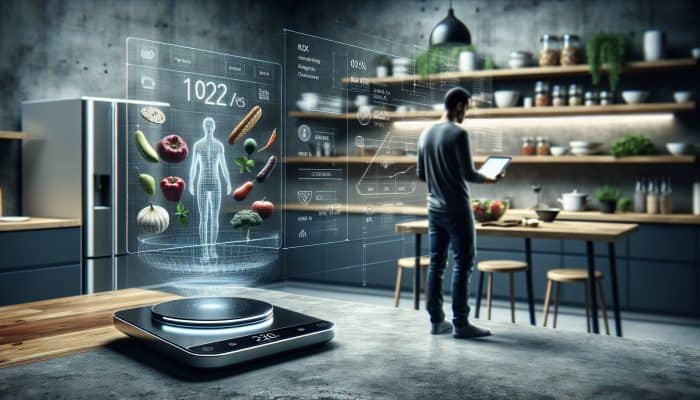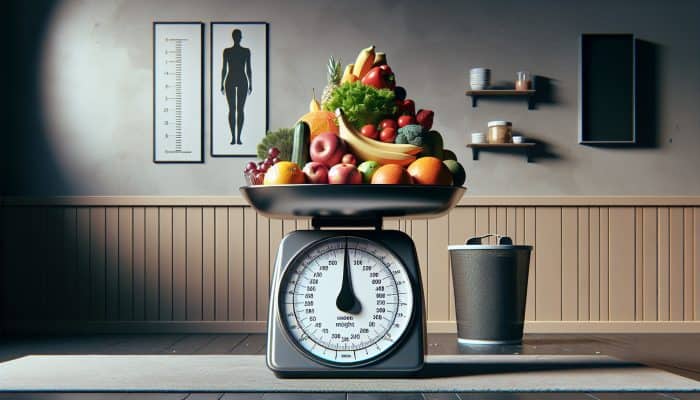Discover the Transformative Benefits of Portion Control Technology for a Healthier Lifestyle
Diving Deep into the Essential Features of Portion Control Technology

Portion control technology signifies a revolutionary approach to managing food intake, utilizing digital tools and smart devices that encourage healthier eating habits. This cutting-edge technology encompasses a diverse array of solutions, such as smart kitchen scales and mobile applications that empower individuals to take charge of their nutritional habits and guarantee that they consume proper portion sizes. By effectively utilizing these tools, users can make educated dietary choices that promote a more balanced and health-focused lifestyle.
Incorporating technology for portion control into daily routines allows users to meticulously track their food intake with remarkable precision. For example, smart scales can connect seamlessly to apps that monitor caloric consumption, providing invaluable insights into personal dietary patterns. This integration not only enhances self-awareness but also reinforces accountability, simplifying the process of achieving individual health objectives. As technology continues to advance, the potential for utilizing these tools to improve health outcomes is vast and incredibly encouraging.
Combatting the Obesity Epidemic in the UK with Strategic Portion Control Approaches
The escalating obesity epidemic in the United Kingdom presents a significant public health issue, with a large segment of the population classified as overweight or obese. Portion control stands out as a vital strategy to address this urgent concern. By educating themselves about appropriate serving sizes and making conscious food decisions, individuals can effectively lower their caloric intake and enhance their overall dietary quality.
Research demonstrates a clear link between larger portion sizes and overeating, underscoring the necessity for UK residents to adopt effective portion control strategies. The promotion of healthier eating habits, facilitated by technology, can play a crucial role in this effort, encouraging individuals to rethink their meal preparation and consumption methods. As awareness surrounding the importance of portion sizes continues to rise, the adoption of technology for portion control becomes increasingly essential in nurturing lasting behavioral changes.
Harnessing Technology for Effective Mastery of Portion Management
The intersection of technology and nutrition offers numerous opportunities for individuals seeking to efficiently manage their portion sizes. Smart kitchen gadgets, mobile applications, and wearable devices collectively provide innovative solutions for tracking food intake. These tools empower users to make informed decisions regarding their meals, assisting them in adhering to dietary guidelines and fulfilling their personal health goals.
For instance, smart scales enable users to accurately weigh their food, while mobile applications store nutritional information and provide instant feedback on portion sizes. This immediate access to data allows individuals to monitor their progress over time, fostering a more mindful approach to eating. By integrating technology into their daily habits, residents of the UK can deepen their understanding of portion control and ultimately enhance their health outcomes.
Unveiling the Extensive Advantages of Portion Control Technology

The advantages of implementing technology for portion control are extensive, particularly for individuals aiming to enhance their health and well-being. A significant benefit is improved weight management, as users learn to identify suitable portion sizes and make healthier food choices. This is especially relevant in the UK, where rising obesity rates demand effective strategies to tackle this health crisis.
Additionally, utilizing technology for portion control can greatly diminish food waste. By precisely measuring food portions, individuals can minimize leftovers and ensure they make the most of all the food they prepare. This not only positively impacts personal finances through reduced waste but also promotes environmental sustainability. Ultimately, incorporating technology into portion control practices can lead to improved health outcomes, making it a worthwhile investment for individuals throughout the UK.
Explore the Latest Smart Kitchen Gadgets for Effective Portion Control
Transforming Portion Management with Cutting-Edge Smart Scales and Measuring Tools
Smart scales and measuring instruments have revolutionized the approach to portion control for individuals in the UK. These devices provide precise measurements, enabling users to manage their food intake with unmatched accuracy. Unlike traditional scales, smart scales often incorporate advanced technology that syncs with mobile applications, allowing users to track their caloric consumption effortlessly.
Equipped with built-in nutritional databases and connectivity to health applications, smart scales empower users to make informed decisions regarding their meals. For example, while preparing a recipe, users can weigh ingredients and receive immediate feedback on portion sizes and caloric content. This instant access to information promotes more mindful eating practices, aligning with health goals and dietary restrictions.
The growing popularity of smart scales in the UK reflects increased awareness of the importance of portion control. As consumers become more health-conscious, investing in these gadgets has become common in various households. By harnessing this technology, individuals can gain deeper insights into their eating habits and make necessary adjustments, ultimately leading to healthier lifestyle choices.
Enhancing Meal Preparation with Smart Connected Kitchen Appliances

Connected kitchen appliances are reshaping the landscape of healthy cooking in the UK. Smart fridges, ovens, and various other devices come equipped with features that promote portion control while simplifying meal preparation. For instance, smart ovens can provide precise guidance on cooking times and temperatures based on portion sizes, ensuring meals are both delicious and appropriately portioned.
Furthermore, many connected appliances can sync with mobile applications, enabling users to plan meals and effectively track their nutritional intake. This integration creates a seamless cooking experience where individuals can easily monitor their portion sizes while preparing nutritious recipes. The convenience offered by smart appliances encourages healthier choices, reducing reliance on takeaway meals and processed foods.
In the UK, where busy lifestyles often lead to dietary shortcuts, connected kitchen appliances provide innovative solutions. By advocating for portion control and healthy cooking practices, these gadgets help individuals develop a more balanced approach to eating, ultimately contributing to improved health outcomes.
Maximising Benefits Through Integration with Health Applications
The seamless connection of kitchen gadgets with health applications significantly enhances the user experience concerning portion control. Many smart kitchen devices can connect with popular health apps, allowing users to effortlessly track their food intake. This integration offers a holistic approach to managing portion sizes and nutritional intake, streamlining the path toward achieving health objectives.
For instance, when users weigh their food on a smart scale, the data can automatically sync with a connected health app. This eliminates the need for manual entry, providing real-time feedback on caloric consumption. Users can also access portion size guides and nutritional information through these applications, empowering them to make informed decisions while cooking or dining out.
In the UK, the availability of such integrated systems has simplified the adoption of healthier eating habits. The convenience of having all relevant data consolidated in one location empowers users to track their progress and adjust their portion sizes as needed. Overall, the synergy between kitchen gadgets and health apps fosters a more mindful approach to eating, leading to improved health outcomes for individuals across the nation.
Utilising Mobile Applications for Effective Portion Control Management
Top Mobile Applications Revolutionising Portion Control in the UK
Mobile applications have become indispensable tools for individuals aiming to efficiently manage their portion sizes. In the UK, popular apps such as MyFitnessPal and Lifesum have gained significant traction due to their user-friendly interfaces and comprehensive features. These applications enable users to track their food intake, set health objectives, and consistently monitor their progress.
MyFitnessPal, for instance, features an extensive database of food items, making it easy for users to log their meals and accurately track their portion sizes. With functionalities like barcode scanning and meal suggestions, the app simplifies the process of tracking nutritional intake, thereby promoting adherence to portion control practices. Additionally, Lifesum provides personalized meal plans and portion size recommendations tailored to individual dietary preferences, enhancing its appeal to users in the UK.
As demand for health-focused applications continues to rise, the availability of these tools in the UK reflects a growing awareness regarding the importance of portion control. By leveraging technology, individuals can take control of their nutritional habits and work towards achieving healthier lifestyles.
Exploring Features and Functionalities of Leading Portion Control Applications
The effectiveness of mobile apps for portion control lies in their robust features and functionalities. Many applications offer barcode scanning, allowing users to quickly log food items by simply scanning the packaging. This feature not only saves time but also ensures users receive accurate nutritional information for the items they consume.
Meal logging capabilities constitute another essential aspect of these apps, enabling users to document their food intake and effectively monitor portion sizes. With the ability to create custom meals and save frequently consumed items, users can streamline their tracking process, making it easier to adhere to their dietary objectives. Moreover, many applications feature portion size guides and visual aids, helping users grasp what constitutes an appropriate serving.
In the UK, user experiences with these apps have been overwhelmingly positive. Reviews frequently highlight the ease of use and effectiveness in managing portion control, with numerous individuals reporting significant improvements in their eating habits. By incorporating features that cater to user needs, these applications empower individuals to take charge of their nutrition and make informed decisions.
Real User Feedback and Experiences with Portion Control Applications
User feedback regarding portion control apps in the UK provides valuable insight into their effectiveness and functionality. Many individuals have shared transformative experiences, detailing how these tools have heightened their awareness of their eating patterns. The intuitive design and user-friendly interfaces of apps like MyFitnessPal and Lifesum make them accessible to a broad spectrum of users, ranging from novices to seasoned health enthusiasts.
Reviews often emphasize the motivation derived from tracking progress within the app. Users can set goals, monitor their advancement, and connect with a community of like-minded individuals for encouragement. This social aspect fosters accountability, motivating users to remain committed to their portion control practices.
Additionally, many users appreciate the educational component of these apps, as they provide insights into nutritional content and portion sizes. By equipping individuals with knowledge, these applications contribute to a deeper understanding of healthy eating behaviors, ultimately leading to improved health outcomes across the UK.
Enhancing Portion Control Through Integration with Other Health Technologies
The incorporation of mobile apps for portion control with other health technologies significantly amplifies their effectiveness. Numerous apps can sync with fitness trackers and smart scales, creating a comprehensive health management ecosystem. This interconnectedness enables users to track both their food intake and physical activity in one place, offering a holistic approach to health.
For example, when users log their meals in a portion control app, the data can reflect in their fitness tracker, providing insights into how dietary choices impact overall activity levels. This synergy encourages users to make more informed decisions about both their food intake and exercise routines, leading to a more balanced lifestyle.
In the UK, the growing accessibility of these technologies has motivated individuals to embrace healthier habits. The ability to simultaneously track food intake and physical activity empowers users to take control of their health and well-being. As technology continues to evolve, the potential for further integration within health management systems will only enhance the effectiveness of portion control practices.
Embracing Wearable Technologies for Enhanced Portion Control
Utilising Smartwatches and Fitness Trackers to Foster Healthier Eating Habits
Smartwatches and fitness trackers have emerged as invaluable companions in the pursuit of effective portion control. In the UK, these devices not only monitor physical activity but also offer features to track food intake, providing users with real-time feedback on their dietary choices. This integration fosters adherence, enabling individuals to achieve their health goals with greater ease.
For instance, many fitness trackers allow users to log their meals and snacks directly through connected mobile apps. This seamless integration enables users to effortlessly track their caloric intake and adjust their portion sizes as needed. Furthermore, some wearables offer reminders to help users stay on track, prompting them to make healthier choices throughout the day.
As UK residents become increasingly health-conscious, the popularity of smartwatches and fitness trackers continues to rise. These devices empower individuals to take charge of their nutrition, fostering a more mindful approach to eating. By leveraging technology, users can enhance their overall health and well-being while effectively managing their portion sizes.
Integrating Wearable Devices with Dietary Plans for Optimal Health Outcomes
The capacity of wearable devices to integrate with popular dietary plans significantly enhances their effectiveness in promoting portion control. Many smartwatches and fitness trackers offer compatibility with established dietary programs, allowing users to tailor their food intake based on specific guidelines. This synergy between technology and nutrition creates a streamlined approach to health management.
For example, individuals adhering to low-carb or ketogenic diets can receive tailored portion size recommendations directly from their wearables, ensuring that their meals align with their dietary requirements. This level of personalization empowers users to make informed decisions about their food choices, ultimately leading to better adherence to their diet plans.
In the UK, the growing accessibility of these technologies has encouraged more individuals to adopt healthier eating habits. By providing users with the necessary tools to effectively manage their portion sizes, wearables play a crucial role in promoting overall health and well-being.
Harnessing Earables for Comprehensive Health Monitoring and Portion Control
The advantages of wearable technology for health monitoring extend beyond mere fitness tracking, encompassing effective portion control as well. Continuous monitoring and feedback from smartwatches and fitness trackers enable users in the UK to maintain their portion sizes and gain a clearer understanding of their eating habits. This level of awareness is essential for individuals aiming to achieve specific health goals, such as weight loss or improved nutritional intake.
For example, wearables can track trends in food consumption, highlighting patterns that may lead to overeating or unhealthy eating behaviors. By identifying these trends, users can make informed adjustments to their portion sizes, fostering a more mindful approach to eating. Additionally, many devices provide insights into how dietary choices affect overall health, giving users a comprehensive view of their well-being.
The adoption of wearable technology for health monitoring has gained traction in the UK, with numerous individuals reporting significant improvements in their portion control practices. By leveraging these devices, users can gain a deeper understanding of their dietary habits and implement meaningful changes toward healthier living.
The Impact of AI and Machine Learning on Portion Control Practices
Personalised Portion Recommendations via Advanced AI Technology
Artificial intelligence (AI) and machine learning have the potential to transform how individuals in the UK manage their portion sizes. By analyzing personal health data and dietary preferences, these technologies can provide customized portion size recommendations tailored to each user's unique needs. This level of personalization enhances the effectiveness of portion control strategies, empowering individuals to make informed choices regarding their food intake.
For instance, AI-powered applications can evaluate factors such as age, weight, activity level, and health goals to generate ideal portion sizes for users. This personalized approach ensures that individuals receive recommendations aligned with their specific dietary requirements, supporting a more effective strategy for weight management and overall health.
In the UK, the integration of AI and machine learning into portion control practices signifies a substantial advancement in health technology. As consumers increasingly seek personalized solutions for their dietary needs, the potential for these technologies to enhance health outcomes is immense.
Utilising Predictive Analysis to Gain Insights into Eating Habits
Predictive analysis powered by AI can significantly enhance the understanding of eating habits among UK residents. By analyzing patterns in food consumption, these technologies can identify trends and behaviors that may lead to poor dietary choices. This information empowers users to proactively adjust their portion sizes, promoting healthier eating practices.
For example, if an AI-driven application detects that a user tends to overeat during specific times of the day, it can provide customized suggestions to help them manage their portion sizes more effectively. This proactive approach to portion control enables individuals to take charge of their eating habits, ultimately leading to improved health outcomes.
As AI technology advances, its application in portion control is likely to expand, offering users in the UK even greater insights into their dietary behaviors. By harnessing predictive analysis, individuals can cultivate a deeper understanding of their eating habits, fostering a more mindful approach to nutrition.
Advancing Smart Home Systems with AI-Powered Portion Control
The integration of AI-driven portion control technology with smart home systems represents a groundbreaking advancement in health management. By connecting devices such as smart fridges, ovens, and meal planning apps, users can create a cohesive ecosystem that promotes healthy eating habits. This interconnectedness not only simplifies meal preparation but also strengthens portion control strategies.
For instance, a smart fridge can suggest portion sizes based on available ingredients, while an AI-driven meal planning app can propose recipes that align with a user’s dietary preferences. This level of integration equips users in the UK with the necessary tools to make healthier choices while streamlining their cooking experience.
As smart home technology continues to evolve, the potential for enhanced portion control practices will only increase. By leveraging these advancements, individuals can take command of their nutrition and cultivate healthier eating habits that contribute to improved overall health.
AI-Driven Nutritional Guidance for Informed Eating Choices
AI-driven nutritional guidance offers personalized insights into portion sizes and dietary needs, empowering users in the UK to make informed decisions regarding their food intake. By analyzing individual health data, these technologies can provide tailored advice that aligns with users’ specific goals, whether related to weight loss, muscle gain, or overall wellness.
For instance, AI applications can recommend portion sizes tailored to users’ dietary restrictions, ensuring they receive necessary nutrients while adhering to their health goals. This personalized approach fosters a deeper understanding of nutrition, enabling individuals to make more informed choices about their meals.
The integration of AI-driven nutritional guidance into portion control strategies represents a significant advancement in health technology. As more individuals in the UK seek personalized solutions for their dietary needs, the potential for these technologies to enhance health outcomes is boundless.
Employing Machine Learning to Effectively Minimise Food Waste
Machine learning technology plays a vital role in reducing food waste by predicting optimal portion sizes and consumption patterns. In the UK, this technology can assist households and businesses alike in minimizing waste by providing insights into how much food to prepare based on historical data and consumption trends.
For example, machine learning algorithms can analyze eating behaviors to suggest appropriate portion sizes for upcoming meals. By accurately predicting food consumption, users can avoid over-preparing meals that lead to waste, ultimately benefiting both their finances and the environment.
As awareness of food waste issues escalates in the UK, integrating machine learning into portion control practices provides an innovative solution. By leveraging the power of technology, individuals can adopt more sustainable eating habits while effectively managing their portion sizes.
Exploring Educational Resources and Workshops for Mastering Portion Control
Participating in Interactive Online Courses and Tutorials on Portion Control Techniques
Online courses and tutorials have become invaluable resources for individuals seeking to master portion control techniques. In the UK, numerous platforms provide educational content that incorporates technology, offering practical applications for effectively managing food intake. These resources often cover essential concepts, including understanding portion sizes, nutritional content, and the impact of eating behaviors on overall health.
By accessing these online courses, users can learn at their own pace and develop a deeper understanding of portion control. Many programmes include interactive elements, such as quizzes and assignments, to reinforce learning and encourage application in real-life situations. This engagement enhances the educational experience, empowering users to adopt healthier eating habits.
As technology continues to play a pivotal role in health education, the availability of online resources in the UK is expected to expand. By embracing these tools, individuals can take charge of their nutrition and cultivate a more mindful approach to portion control.
Engaging in Hands-On Workshops and Seminars for Practical Learning Experiences
In-person workshops and seminars focused on portion control are essential for fostering a comprehensive understanding of healthy eating practices in the UK. These events often provide hands-on learning experiences, allowing participants to engage with experts in the field and gain valuable insights into effective portion control strategies.
During workshops, attendees can learn practical techniques for measuring portion sizes, understanding nutritional content, and applying technology to enhance their eating habits. The interactive nature of these sessions fosters a supportive community, encouraging participants to share their experiences and learn from one another.
As demand for education on portion control continues to rise, in-person workshops will play a crucial role in equipping individuals with the knowledge and skills necessary to make informed dietary choices. By embracing these opportunities, participants can take significant steps toward improving their health and well-being.
Utilising Educational Apps and Tools for Engaging Learning Experiences
Educational apps and digital tools in the UK offer interactive learning experiences that help users master portion control techniques. These applications often feature games, quizzes, and visual aids that make learning about nutrition engaging and accessible. By leveraging technology, these tools can help users develop a deeper understanding of portion sizes and healthy eating habits.
For instance, some educational apps provide interactive meal planning tools that enable users to experiment with various portion sizes and ingredient combinations. This hands-on experience cultivates a practical understanding of how portion control impacts overall health. Integrating these educational resources into daily routines can lead to improved eating behaviors and better health outcomes.
As technology continues to evolve, the availability of educational apps and tools in the UK is expected to expand, providing users with even more resources to master portion control. By embracing these innovative solutions, individuals can take charge of their nutrition and strive towards healthier lifestyles.
Addressing Frequently Asked Questions About Portion Control Technology
What Does Portion Control Technology Entail?
Portion control technology refers to a range of digital tools and smart devices designed to assist individuals in managing their food intake and promoting healthier eating habits.
Why is Portion Control Vital in the UK?
Portion control is crucial in the UK for combating obesity and fostering a healthier lifestyle, as many individuals struggle with appropriate portion sizes and often tend to overeat.
How Can Technology Facilitate Portion Control?
Technology offers solutions such as smart scales, connected kitchen appliances, and mobile apps that effectively monitor food intake and portion sizes.
Which Mobile Applications are Leading for Portion Control in the UK?
Prominent apps in the UK include MyFitnessPal and Lifesum, which assist users in tracking their food intake and managing portion sizes effectively.
What Features Should Users Anticipate from These Portion Control Apps?
These apps typically provide features such as barcode scanning, meal logging, and portion size guides to support users in managing their intake.
How Can Wearable Technology Enhance Portion Control?
Wearable technology can track food intake, send reminders, and integrate with diet plans to help users maintain healthy portion sizes.
What Role Does AI Play in Portion Control Strategies?
AI can deliver personalized portion size recommendations, predict eating habits, and provide tailored nutritional guidance based on individual health data.
Are There Educational Resources Available to Help Me Master Portion Control?
Numerous online courses, workshops, and educational apps in the UK teach effective portion control techniques.
How Does Machine Learning Help in Reducing Food Waste?
Machine learning can predict optimal portion sizes and consumption patterns, helping users prevent over-preparing meals and minimising food waste.
What Benefits Can Users Expect from Employing Portion Control Technology?
Benefits include improved weight management, decreased food waste, and enhanced overall health outcomes for users in the UK.
Connect with us on Facebook!
The Article Tech for Portion Control: Smart Eating Solutions Was First Published On https://acupuncture-frome.co.uk
The Article Portion Control Tech: Innovative Solutions for Smart Eating Was Found On https://limitsofstrategy.com
The Article Portion Control Tech: Smart Eating Solutions Unveiled First Appeared ON
: https://ad4sc.com

